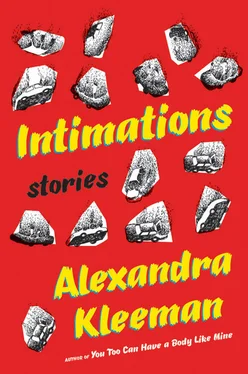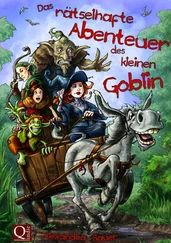A house at night should not be woken into alone, if other methods can be made available. The presence of a parent via effigy, by means of photograph or even an object that they have been seen to love, hate, or merely hold, may be presented to the darkened house as evidence of the presence, past or future, of others with an investment in your existence. The notion of a linkage between yourself and another, by means of structure or form, will impress the house and render it less likely to target you with unidentified sounds and shadows.
We play a game involving the description of the walls, but we are both so good at it that we cannot but fail to surprise each other.
Are there ghosts in the house, and if there were, how would they have gotten in? I tuck the quilt in under my feet, I close the closet door and turn on three different nightlights. These things will yield, if not safety, then an allusion to the idea of it. If there were ghosts in the house, how lonely would they be? With no one to see me, I become like a vapor.
The emptiness within the house populates what lies beyond it. Lightning walks the plain like a tall, glowing man. He looks toward me and at once he is gone.
I explain to her the mechanics of daring. She must step outside the door. Outside the door, the day roils with temperatures that would touch our skin.
I explain it. Gameplay proceeds by turns, with each player advancing the series by one. One player’s proposal for action on the part of another is balanced by a counterproposal for a different sort of action by a different person. She must step outside the door. But when will the action be performed? The emphasis is upon daring, not doing. If it were only about doing, we could do it alone, in our separate rooms, with the door closed. I explain to her that this process may bring joy nevertheless, though she remains impermeable to this point, sprawled sideways on the carpet and staring deeply into it.
As I watch her stare under the couch or into the cabinets, I imagine that she may be dissatisfied with the network of beings and objects that she is required to live among. Escape from the scale she was born into could be achieved by burrowing into phenomena of a different scale, belonging to the world of much larger or smaller things.
Our father, for example, has escaped us, has escaped deeper into the house or laboratory, to a position behind a final door through which the sounds of shouting are audible. Our mother proceeds laterally, walking her eyes around at their much greater height, as if in a walking form of sleep. They exist for their work, and are lost to us now.
Experienced by a much smaller being, this day would glow with the excess beauty of certain of its shorter intervals. The moment, for example, when a spoon fell from the table and onto the kitchen floor in the brilliance of an unlonely afternoon. Stretched to a beautiful length, the resulting sound would have rung out for nearly an hour, rung out like a force of nature, a piece of the air. We would not have had to think of a new game, living our joys in the shadow of this long, loud sound.
Even with all this in mind, she must step outside the door.
Standing before the door, I speak to her. I explain to her the ultimate aim of the game of daring: to dare someone to do what is impossible to do, and thereby undo themselves. With this in mind, I dare her to open the door and step through it. Into the murderous gales of the sky, I say, though I cannot see the sky from in here. She looks at me glassy-eyed. She has become more doll-like day by day, spending her hours heaped sideways and still, looking under the furniture at things I can only infer. I repeat myself and wait for surrender.
My sister looks toward the door and places one small hand on the lock. I hear a small, clean turning sound and the rush of air. Then she is over the threshold and moving. I run to the door to close the air out. But I open it again slightly, I watch her through the gap in the door.
Both arms out straight and extended, she walks like someone on a balance beam, down the driveway, teetering away from the door, away from me, twirling around, hopping on an imaginary hopscotch grid. The sunlight draws a yellow haze around her, her hair, her small false hands. Watching her walk away is like watching myself depart, though when I look down, I find I am in place.
At the end of the driveway, she turns and looks back at me from a distance.
Then she is gone.
I plunge my whole fist into the jam jar. I write my name, and your name, all your names, on the wall. I tidy the china with a soft dustcloth. I rage and rage and rage and rage at the furniture that still resembles human beings, at the ones shaped like people I shout my language. There seem to be fewer. I am picking the blueberries out of the muffins, the toppings off the frozen pizzas, still frozen. Ever ever fewer. I am shiny, sticky. I run around and around, trailing berry-colored handprints, and when I get back to the start I grow silent and track myself, quietly, through the halls, soundlessly, I am like I am not there, I am there like I am not there, I am my own ghost trailing my own ghost to some indeterminate point in time, forward and backward on a track made of iron. I plunge my fist into the jam jar. I make a peanut butter and jelly sandwich of the fatherly armchair. Where have you all gone? So I write your name on the sticky surface. So I dust the furniture, even lifting the vases, plates, etcetera, to clean under them. But no one is pleased. No one is bothered. There is no one to be pleased. I rule these lands, and there are none that could dare question these acts, or declare them unjust, or affirm that they have come to pass or have not. As a result, do they come undone? I try to do a thing so large or heavy that it recognizes itself, that it does not need someone else to see it to make it endure. I try to carve my name into the wall. I tie all the things to one another with red string. It will not guard against their leaking, slowly, from inside these walls and out, who knows.
I play a game of making it rain. I fill the sky with clouds, I label and describe them one by one. They are all different types, collecting at the ceiling of the living room. I check the forecast in the newspaper, I comment on the dark storm brewing overhead. I hold my hand out, but I feel nothing.
It is necessary that “the child find him or herself confronted by his or her own increasingly ‘ordered’ behavior as, from the world of practice and play, the world of the adult is grown into.” Is it necessary for this world to be so quiet, its contents captured between parentheses?
When the actual shape of the liquid’s breakage was discovered, there were two basic tactics that could have been adopted. The first was to reshape the preferences of the liquid, training it toward a manageable complexity that would reveal itself legibly — as a hexagon or a torus, for example. The second would have been to reshape ourselves.
In the context of the development of an organism into an organism that masters its surroundings, reshaping ourselves would have been to “grow backward.”
Backward was the more populated direction, and had a tendency to look beautiful as a result. The orientation of our faces on the fore side of our bodies, luckily, made it more difficult to see and long for that direction, which was becoming farther away all the time.
I wake to a Mother standing by the bed, a Father by the window with his hand on the cord, pulling the blinds open. The blinds are never open.
Читать дальше












